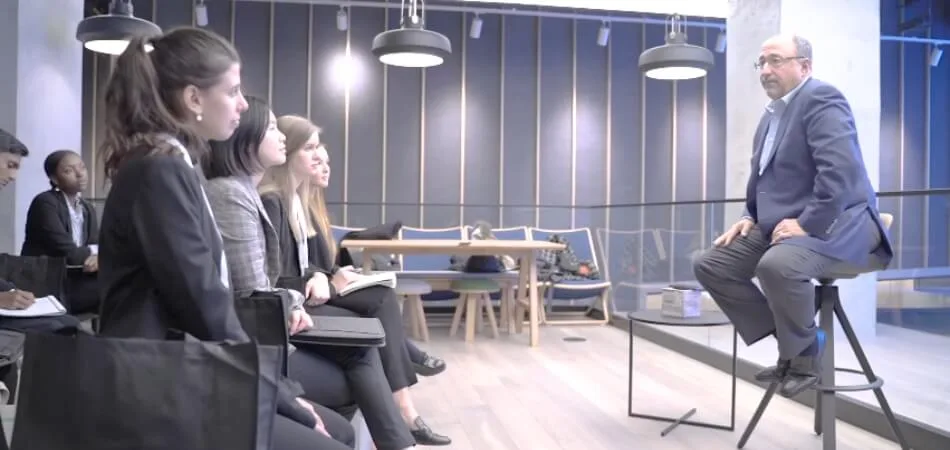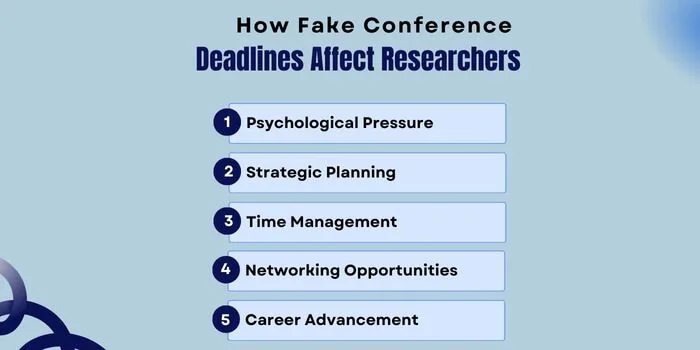It is common for conferences to have fake deadlines, but they are often misunderstood. These deadlines can confuse researchers trying to navigate submission timelines. As attendees ponder their implications, a natural question arises: Why do conferences have fake deadlines? This curiosity highlights the complexities involved in academic event planning.
Conferences use fake deadlines to manage the submission process and create a sense of urgency among participants. By setting these artificial cutoffs, organizers can encourage early submissions, speed up peer reviews, and optimize logistics. This strategic approach ultimately ensures a more organized and efficient conference experience for everyone involved.
Still curious about fake deadlines at conferences? If so, continue reading this article, where you will find all the essential information to deepen your understanding of this fascinating topic and its impact on the academic community.
Fake Deadlines in Conference: What Does It Mean?
A fake deadline at a conference refers to an artificial cutoff date set by organizers for paper submissions. These deadlines may appear genuine, but they do not carry any real consequences if missed. They are designed to influence how researchers plan their submissions without creating strict rules.
Fake deadlines are often strategically placed before the actual submission date. This tactic is intended to create a sense of urgency among researchers, prompting them to submit their work earlier than otherwise. This approach helps conference organizers manage the submission process more effectively and keeps submission momentum going.
The concept of fake deadlines of conferences is significant in understanding conference planning. By setting these deadlines, organizers can better measure interest and engagement levels. This practice helps them allocate resources efficiently and ensures a diverse array of high-quality papers for the event, ultimately improving the overall conference experience.
Why Do Conferences Have Fake Deadlines?
Researchers are often surprised and puzzled by the presence of fake deadlines in conferences, as they are often used to spark curiosity and excitement. Here are the reasons why a conference has fake deadlines:
Creating a Sense of Urgency
By creating fake deadlines, researchers are motivated to submit their papers earlier than they otherwise would. This urgency encourages proactive behavior and helps prevent a last-minute rush, ensuring a smoother submission process for both participants and organizers.
Inspiring Early Submissions
The purpose of setting fake deadlines is to encourage early submissions and ensure a steady flow of papers throughout the submission period. Early submissions allow organizers to better manage the peer review process, manage resources efficiently, and maintain a high standard of quality for accepted papers.
Managing Peer Review Timelines
Having fake deadlines in place helps organizers manage the peer review process more efficiently. Early submissions allow ample time for thorough peer review, feedback, and revisions, ensuring that accepted papers meet the required standards of quality before being presented at the conference.
Optimizing Presentation Logistics
By encouraging early submissions through fake deadlines, organizers can better manage the logistics of paper presentations. Knowing the number and topics of accepted papers in advance allows organizers to plan presentation schedules, assign session moderators, and ensure a balanced and engaging conference program.
Maximizing Participant Engagement
A fake deadline is critical to maximizing participation and engagement at conferences. The organizers can ensure a diverse range of presenters by creating a sense of pressure and encouraging early submissions.
Facilitating Efficient Planning
Conference organizers can better plan and coordinate various aspects of the event by creating fake deadlines. By encouraging early submissions, organizers can better gauge the level of interest in the conference, finalize the program schedule, and plan resources such as venues and equipment in advance. This planning becomes even more crucial when you need to identify fake conferences to avoid potential issues.
Improving the Overall Conference Experience
The use of fake deadlines contributes to improving the overall conference experience for both presenters and attendees. By promoting early submissions, efficient planning, and optimal presentation logistics, organizers can create a more organized, engaging, and rewarding conference environment for all participants.
Fake deadlines in conferences serve multiple purposes, ranging from creating a sense of urgency and stimulating early submissions to facilitating efficient planning and improving the overall conference experience.
Fake deadlines enable conference organizers to plan and coordinate various aspects of the event more effectively. By encouraging early submissions, organizers can accurately gauge the level of interest in the conference, finalize program schedules, and allocate resources such as venues and equipment in advance.
How Can Researchers Identify Fake Deadlines in Conferences?
The ability to identify fake deadlines in conferences is crucial for researchers navigating the submission process. It is possible to avoid unnecessary stress and improve planning by recognizing artificial deadlines. Research can be informed by understanding certain indicators. Knowing these deadlines allows for a more strategic approach to conference participation.
Step 1. Check the Conference Website Regularly
A regular visit to the conference website is essential for researchers. Often, organizers will provide updates about deadlines and submission dates. If there are frequent changes or updates, it may indicate that the deadline is not genuine. Keeping an eye on official announcements helps clarify any uncertainties.
Step 2. Look for Consistency in Deadlines
Compare the deadlines of the current conference with previous editions. If the deadlines seem unusually early or inconsistent with past events, this could be a red flag. Familiarity with the typical timeline for submissions helps researchers identify any irregularities in the current year’s schedule.
Step 3. Research the Conference Organizers
Investigating the reputation of the conference organizers can provide valuable insights. Reputable organizers usually follow established practices regarding deadlines. Checking their past conferences and how they manage submissions can help researchers assess the validity of the current deadlines.
Step 4. Get Feedback from Peers
Engaging with colleagues and fellow researchers can provide additional perspectives on the conference. Discussing experiences related to deadlines can reveal common patterns. Peers may have insights about the conference’s reliability and the likelihood of encountering fake deadlines.
Step 5. Analyze the Communication from Organizers
Pay attention to how the conference organizers communicate deadlines. Clear and consistent messaging is a positive sign, while unclear or confusing communication can indicate potential issues. Understanding the tone and clarity of the information shared helps researchers gauge the authenticity of the deadlines.
Being prepared to identify fake deadlines can enhance the overall conference experience for researchers. Awareness and careful assessment of various factors contribute to making informed decisions about conference participation.
Impact of Fake Conference Deadlines on Researchers
A fake deadline can have significant implications for researchers, affecting their submission strategies and overall conference experience. Understanding the types of impact these fake deadlines can have is crucial for getting through the conference setup effectively.
Psychological Pressure
Creating false deadlines increases researchers’ stress and anxiety about meeting submission requirements, resulting in heightened stress and anxiety. This pressure can impact the quality of research and may result in rushed or incomplete submissions, affecting the overall academic integrity of the conference.
Strategic Planning
Researchers often resort to strategic planning in response to fake deadlines, adjusting their submission timelines to maximize their chances of acceptance. This may involve prioritizing certain papers over others, collaborating with peers to meet deadlines, or strategically selecting conferences based on their submission requirements and deadlines. As part of this strategy, researchers must be careful in understanding predatory conference practices that may take advantage of these pressures.
Time Management
Managing time effectively becomes essential for researchers dealing with fake deadlines, as they must balance their academic responsibilities with the constraints of submission timelines. This may require careful prioritization of tasks, efficient allocation of resources, and timely communication with coauthors and conference organizers.
Networking Opportunities
Fake deadlines can also impact researchers’ opportunities for networking and collaboration within the academic community. Meeting early submission deadlines may allow researchers to secure speaking slots, participate in panel discussions, or engage in networking events, increasing their visibility and professional connections within their field.
Career Advancement
For early career researchers, dealing with fake deadlines can be particularly challenging, as successful conference presentations can significantly impact their career advancement prospects. Meeting submission deadlines and presenting research at prestigious conferences can increase visibility, reputation, and opportunities for future collaborations and funding.
The impact of fake conference deadlines on researchers extends beyond mere submission timelines, influencing psychological well-being, strategic planning, time management, networking opportunities, and career advancement.
Frequently Asked Questions about Why Do Conferences Have Fake Deadlines?
Get a deeper understanding of the common queries surrounding the use of fake deadlines in conferences and their impact on researchers. These FAQs address key concerns and provide clarity on how fake deadlines can shape the conference experience for everyone involved.
How Do Fake Deadlines Benefit Conference Organizers?
Fake deadlines help organizers gauge interest in the conference by prompting researchers to submit their papers early. This practice allows them to manage peer review timelines effectively and optimize presentation logistics, ensuring a smoother and more organized conference experience for all attendees.
Can Researchers Strategize Around Fake Deadlines?
Yes, researchers often adjust their submission timelines strategically to align with fake deadlines. By doing so, they can increase their chances of acceptance. This involves planning their work ahead, prioritizing specific papers, and coordinating with co-authors to meet these artificial deadlines.
Do Fake Deadlines Impact Researchers’ Stress Levels?
Yes, the psychological pressure created by fake deadlines can significantly increase researchers’ stress and anxiety levels. The fear of missing a deadline may lead to rushed work or diminished quality, ultimately affecting the research and its presentation at the conference.
How Do Fake Deadlines Affect Networking Opportunities?
Meeting early submission deadlines can enhance researchers’ visibility and participation in networking events. By submitting papers on time, researchers can secure speaking slots and engage in panel discussions, which promote collaboration and strengthen connections within the academic community.
Are There Any Drawbacks to Using Fake Deadlines?
While fake deadlines serve various purposes, they may lead to confusion or frustration among participants if not communicated effectively by conference organizers. Researchers may feel misled or pressured, which can detract from their overall conference experience and engagement.
Conclusion
Understanding the reasons behind fake deadlines is key to optimizing one’s conference experience. So, “Why do conferences have fake deadlines?” stands as a very important question, influencing submission strategies, networking opportunities, and stress management for participants.
These artificial deadlines serve multifaceted purposes, from instilling urgency to streamlining event logistics. By understanding the significance of fake deadlines, individuals can participate in conferences across various fields with enhanced clarity and effectiveness.








